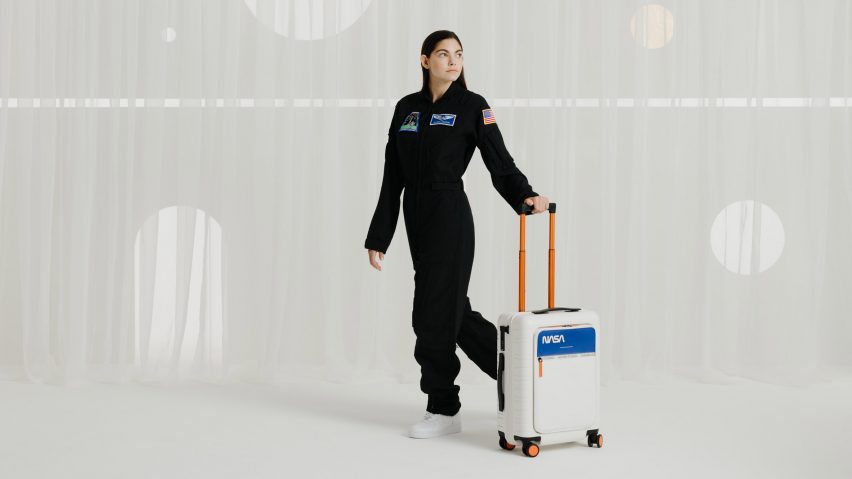Berlin-based luggage brand Horizn Studios collaborated with the world's youngest astronaut, Alyssa Carson, to develop a smart, carbon fibre suitcase suitable for space tourism.
The Horizn One case concept boasts a shell that would be made from carbon fibre reinforced with super-material graphene. This would enable enhanced flexibility and strength as well as making it ultra-lightweight.
An inbuilt smart screen in the suitcase could also be used to connect travellers with their friends and family back on earth, while a biometric security function lets the user unlock the case with fingerprint recognition.
The company founded by entrepreneurs Stefan Holwe and Jan Roosen created the Horizn One concept to coincide with the 50th anniversary of the Apollo 11 mission, which landed the first men on the moon in 1969.
The luggage also responds to the recent emergence of space tourism, which several companies are currently exploring.
Richard Branson's firm Virgin Galactic has completed a successful rocket-powered flight, while Texas-based startup Orion Span has unveiled plans for a luxury space hotel.
"Horizn One is the world's first luggage for space travel, which is closer than we think," Holwe told Dezeen.
"This luggage was developed around the question of what a space traveller would need from his or her luggage, and what would that luggage need to function in extreme conditions like zero gravity and limited space," he added.
Horizn worked closely on the proposal with Alyssa Carson, who is the youngest person to be accepted to the NASA-backed Advanced Polar Suborbital Science in the Upper Mesosphere (PosSSUM) Academy, and wants to be the first person to set foot on Mars.
"My generation is closer than ever to space travel, and I've been dreaming of becoming an astronaut since I was three years old," said the 18 year-old.
"I loved working on something that would inspire the next generation of travellers to push their boundaries," Carson continued.
According to Holwe, Carson embodies the firm's ambitions of curiosity, creativity and open collaboration. He claimed that her vision of humans travelling to, and perhaps even living on, Mars challenged them to think beyond their usual remit.
"She is the space industry expert; we are the luggage experts," the entrepreneur explained. "With her astronaut training she knows the extreme conditions space luggage will be subject to."
"Her insights into the challenges of weight and volume efficiency, as well as technical features, were so valuable in the development process," he added.
The Horizn One case also boasts an electromagnetic base that would allow it to attach to the floors or walls of the spacecraft to make storage and access more straightforward in zero gravity.
Extendable straps on the rear surface would also enable the case to be carried as a backpack.
Horizn Studios currently manufactures luggage with accompanying smart features including an integrated removable battery for charging mobile devices and a GPS tracker for locating luggage.
In a video interview filmed in 2017, Holwe and Roosen told Dezeen about how they intend to disrupt the luggage industry by introducing features that "cater to the digital lifestyle of the new generation of travellers".
For Horizn One, the project team envisaged incorporating graphene super-capacitors and an inductive charging field for storing energy and wirelessly charging electronic devices.
In addition to this, the case would include a vacuum-packing feature to maximise space and would be capable of collapsing flat for storage inside the spacecraft.
The designers also proposed incorporating a silver-ion enhanced compartment with a bacteriostatic function for neutralising germs and odours on the traveller's clothes.
When asked how Horizn One might inform the company's future products, Holwe pointed out that some of its futuristic material and technological details are already being used in other industries on earth.
He claimed that space travel will continue to influence its efforts to create next-generation luggage.
"Research and development from the space travel industry will trickle down to earth tourism, just as all technological developments eventually enter the mainstream," he added.
"I think we will start to see the fruits of space travel development very soon. For example, imagine a flight from London to Shanghai that takes just 30 minutes."

